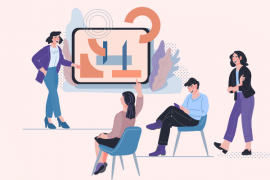By Katy Macek
It’s a fact: The pandemic has affected all of us in small and large ways — the biggest being our finances. Need proof? Wisconsin’s unemployment rate jumped from 3.1% in March 2020 to 14.1% in April 2020, according to the Wisconsin Department of Workforce Development. In other words, no one had time to prepare for how COVID-19 would completely upend our lives (and will continue to for a while) — let alone its impact on our finances, says Carly McCormick, a Madison-based financial advisor with Thrivent.
“It’s totally understandable going into debt during the coronavirus pandemic. That’s where some are at,” McCormick says. “But you can still do so wisely so you’re not just digging a deep hole you can’t get out of.”
Kristen Holt, CEO of GreenPath Financial Wellness, a national nonprofit financial counselor agency with an office in Madison, says, in mid-March, the company’s hotline experienced a 50% increase in calls from people concerned about a sudden job loss and income instability. Debt management was another fretful topic.
Both women can say with certainty: If you are struggling financially right now, you are not alone. And there are things you can do to smartly take on debt.
The good news is, both women have practical advice to help you right now.
Holt’s first piece of advice for GreenPath clients? Grab a notebook.
“We’re all operating under this scarcity mindset with limited mental capacity, because we’re stressed,” she says. “Writing everything down will help you calm down and feel a little sense of control.”
MAKE A CORONAVIRUS BUDGET
If you’re unemployed, make a budget that pares back all but necessities, McCormick says.
Or, perhaps you’re still working full-time and find yourself with
more disposable income, given that travel plans and live music events have been cancelled and most of us are still hesitant about being in crowds. Instead of counting it as extra spending money, allocate it toward something specific.
“Planning for that money that’s suddenly available makes it much more likely it’s going to be there,” Holt says. “It’s one extra step, but there’s a greater likelihood you won’t touch it.”
CALL YOUR LENDERS
Right now, many lenders and landlords are being flexible about payments, Holt says, and it’s certainly worth talking with them about your options.
“It can feel really scary, but they want you to call right now,” Holt says. “They’re being a lot more user-friendly than if you were asking under a personal hardship unrelated to everyone else in the world.”
If you do reach out to them, Holt says, keep a record of all your conversations with them — mailed notices, emails, etc. If you’re feeling uneasy about having these conversations yourself, GreenPath counselors can even make the calls with you, and are available for free financial counseling.
LOOK FOR LOW RATES
Many banks and credit unions are offering low interest “emergency” personal loans right now to help their members. See if your financial institution is offering them or open a new account somewhere you can get one.
“The last thing you want to do is take on a high-rate loan right now when there are friendlier options out there,” Holt says.
But those low-interest auto and home loans on the market? Only get them if you were already planning to, McCormick says.
“It might be best for you to pay off existing debt [instead],” she says. “Don’t get it because it’s a low rate, if you don’t need it.”
TO DEFER OR NOT TO DEFER THOSE STUDENT LOANS
With the federal government dropping student loan interest rates to 0%, McCormick says now could be a “great time for someone who hasn’t taken a financial hit to pay them off.”
But, if you have taken a hit and not paying would put your money to better use, that’s OK too, she says.
QUICK TIPS TO AVOID DEBT
- Cover necessities first (food, shelter, medicine, etc.). Cut frivolous costs.
- Create a coronavirus budget.
- Make a plan for any excess funds.
- Check local banks and credit unions for low interest “emergency” loans.
- Avoid losing money through coronavirus-related scams by directly contacting the company that claims to be communicating with you. Don’t click suspicious links .




